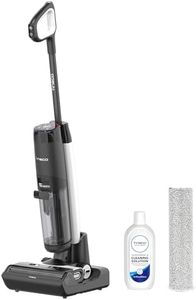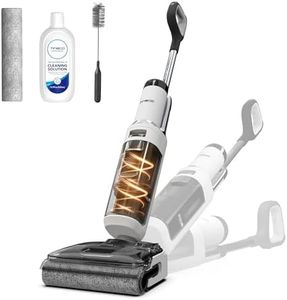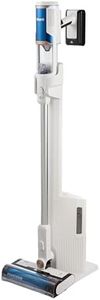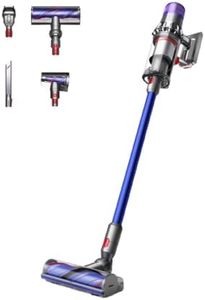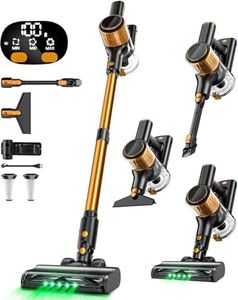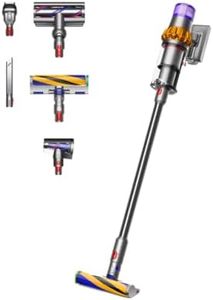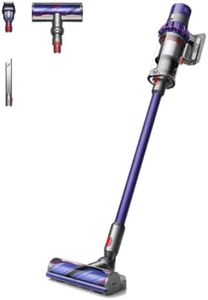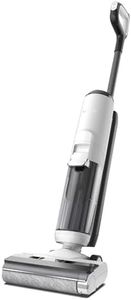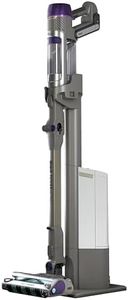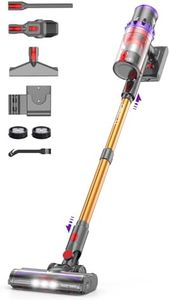We Use CookiesWe use cookies to enhance the security, performance,
functionality and for analytical and promotional activities. By continuing to browse this site you
are agreeing to our privacy policy
10 Best Cordless Pet Vacuums
From leading brands and best sellers available on the web.By clicking on a link to a third party's website, log data is shared with that third party.
Buying Guide for the Best Cordless Pet Vacuums
Choosing the right cordless pet vacuum is all about finding one that fits your home, your cleaning habits, and most importantly, the needs of your furry friends. Pet owners need to pay special attention to features that help tackle pet hair, dander, and the kinds of messes pets create. It's important to consider the layout of your home (such as if you have stairs, lots of carpets, or hard floors), how often you plan to vacuum, and the type of pets you have, as these will all influence which specs matter most for you.Battery LifeBattery life indicates how long you can use the vacuum before needing to recharge it. This is important because it affects how much cleaning you can do at once. Shorter battery lives, typically under 20 minutes, are best suited for small spaces or quick cleanups. Medium battery lives, between 20 to 40 minutes, cater well to most apartments and average-sized homes. Longer battery lives, usually 40 minutes or more, are great if you have a big house, lots of pet hair, or plan on deep cleaning multiple rooms in a single session. If you have a large home or like doing thorough cleans, a longer battery life will save you frustration and waiting time.
Suction PowerSuction power tells you how effectively the vacuum can pick up dirt, dust, and especially pet hair. High suction power is crucial if you have pets that shed a lot or for deep cleaning carpets and rugs. Lower suction power may still be sufficient for homes with mostly hard floors and minimal pet shedding. Higher settings are beneficial for thick rugs and stubborn pet hair, while lower settings might work fine for lighter dirt or in homes with short-haired pets. Let how much your pet sheds and your flooring type determine how much suction you really need.
Filtration SystemThe filtration system traps tiny dust, dander, and allergens. HEPA filters are the gold standard for pet homes, as they capture even microscopic particles. Basic filters trap larger dust but might let fine allergens escape, while advanced HEPA filters keep the air cleaner—especially important if you or anyone in your home has allergies. Choose a vacuum with a strong filtration system if allergy control is a priority, or if your pets shed a lot of fine hair and dander.
Weight and ManeuverabilityThe weight and how easily a vacuum moves around matter a lot when you're cleaning often or carrying it up and down stairs. Lighter vacuums are easier to handle, making them ideal for going over furniture, tackling stairs, or doing quick spot cleanups. Heavier models might offer more power but can be tiring to use for long periods. Think about your comfort and cleaning habits: if you prefer quick, daily cleanups, go light; if you want power for heavy-duty cleaning and don't mind the weight, a sturdier model might be fine.
Pet-Specific Brush and AttachmentsSpecial brushes and attachments designed for picking up pet hair can make vacuuming much easier and more effective. Some vacuums come with tangle-free brushes, mini motorized tools, or dedicated pet hair nozzles. These are essential if pet hair is your main concern, especially on furniture, stairs, or in your car. If your pet sheds a lot or climbs on the furniture, look for a model with several pet-friendly tools. If you mainly clean floors, standard brushes may suffice.
Dustbin CapacityDustbin capacity shows how much dirt and hair the vacuum can collect before it needs emptying. Smaller bins fill up faster, so you'll need to stop and empty them more often—fine for light cleaning or small areas. Larger dustbins are better if your pets shed a lot or if you clean big spaces in one go. Think about how often you're willing to empty the bin and how much pet hair you typically need to pick up.
Noise LevelPet vacuums can be noisy, which might scare pets or be disruptive at home. Quieter models are ideal for skittish pets or if you want to clean without too much disturbance. Noise levels are usually measured in decibels (dB). Lower dB ratings mean quieter operation. If your pets are sensitive or you live in an apartment where noise matters, choose a model specifically designed to run quietly.
